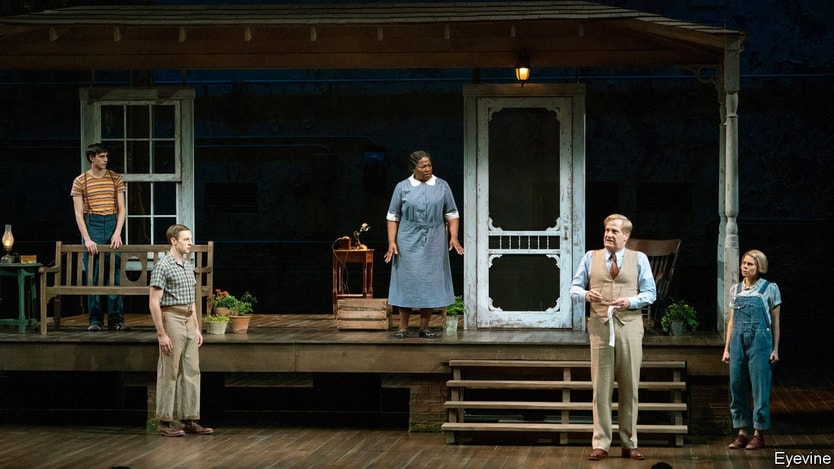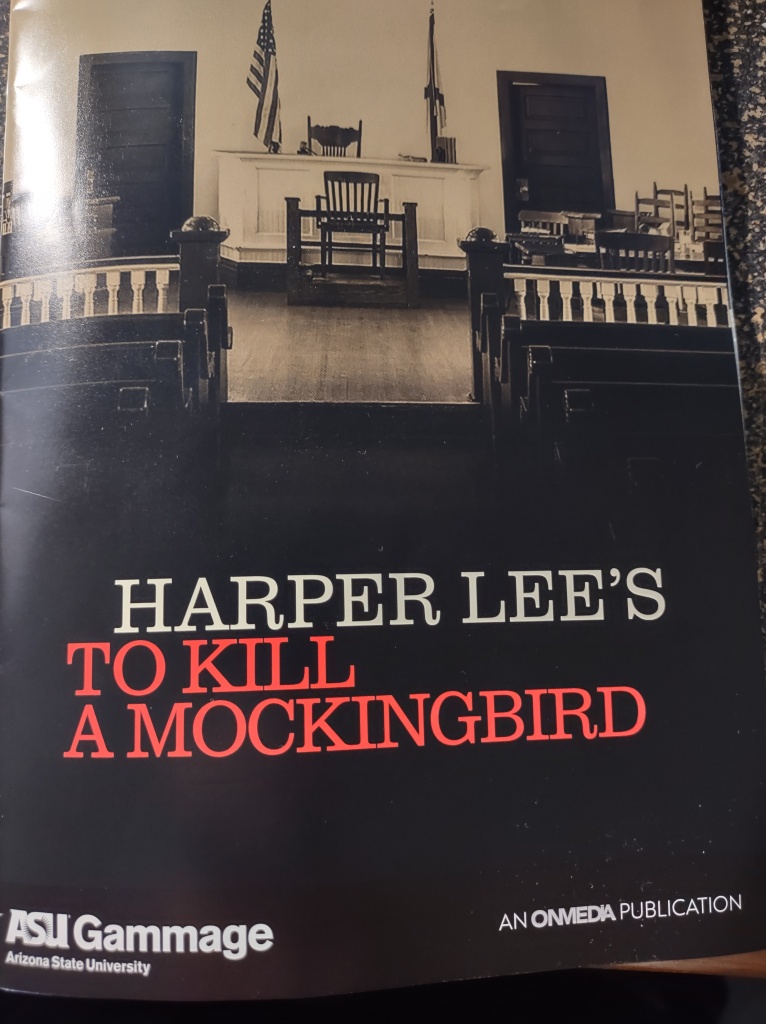
If you’ve been a friend of mine for more than, perhaps, 15 minutes, you know that my favorite book in the world is “To Kill a Mockingbird.” It provides the model by which I live my life. You also know that my favorite living writer is Aaron Sorkin. His dialogue crackles and his Idealism is inspiring. Knowing all this, it’s easy to understand how excited I was that my best friend, Stephanie Hansen, got me tickets to Aaron Sorkin’s play of “To Kill a Mockingbird” for my birthday. In the 14 years we’ve known each other, she’s never gotten me much beyond a potato wrapped in a paper bag for either my birthday or Christmas. She was making up for that all in one powerful present.
We go out to dinner once a month so that I leave my house. Other than doctors’ appointments, I simply don’t do that, ever. So, she decided to combine both my present and our monthly dinner. We went to Garcia’s at 5:00 PM. The show was supposed to start at 7:30. We would have plenty of time to eat and get to the theater.
Stephanie has a compassion for animals that is difficult to overstate. For the last few months, she has been involved in helping to save dogs from death by getting them adopted prior to their euthanasia date. This is a beautiful thing to do. I can’t complain about it. I admire it. Last night, she spent our dinner on the phone trying to save a dog. When she hung up the phone, she had to email someone to finish the project. She finished that just in time for them to bring our boxes to take home the leftovers. It was not our most sparkling dinner conversation.
As we were leaving, I asked her, offhandedly, if she had the tickets. Her eyes grew wide as she realized she had forgotten them. They were on her kitchen counter, roughly 45 minutes away. She began to laugh uncontrollably. She nearly wet herself. She historically finds my suffering to be the funniest thing on Earth. Fortunately, she lives with her ex-boyfriend. I suggested having him get in the car to meet us at the theater. She thought he could just send pictures of the tickets, and we could use those to get in. I was certain that wouldn’t work. Nevertheless, Tim sent her pictures of both the back and front of the tickets. Parking was difficult to find, so Stephanie dropped me off near the door so she could park while I got in line. A moment later, she texted the pictures. Look at them carefully below. See the time? Yes. They were for the 2:00 PM performance. Even in the wildly unlikely event they would accept pictures of the tickets, there was no way on Earth they would be willing to let us in with these. I called her and said just to come get me. My hopes were dashed. I wasn’t going to get to see the show about which I had been so excited for so long. Disappointment didn’t begin to explain my feelings at that moment.

She picked me up, but she refused to admit defeat. She found a place to park and decided to find new tickets online. Miraculously, she found two excellent tickets. Every time she went to get them, however, Ticketmaster said there was a problem, and she should try again in a few minutes. At 7:23, the tickets appeared on her phone.
Running is out of the question for me. Walking is a challenge, but I moved faster than I have in more than 6 years. We got to our seats just as the lights dimmed and the curtain rose.
This post is already far too long, so I’ll write you a proper review of the show later. The Sara Niemietz Stage-It is about to start. However, I got to have a beautiful once in a lifetime experience last night. Stephanie came through. I love her very much.
“Heck, let’s go out on the front porch. There are plenty of chairs out there, and it’s still warm enough.”
I wondered why Atticus was inviting us to the front porch instead of the living room, then I understood. The living room lights were awfully strong.
We filed out, first Mr. Tate—Atticus was waiting at the door for him to go ahead of him. Then he changed his mind and followed Mr. Tate.
People have a habit of doing everyday things even under the oddest conditions. I was no exception: “Come along, Mr. Arthur,” I heard myself saying, “you don’t know the house real well. I’ll just take you to the porch, sir.”
He looked down at me and nodded.
I led him through the hall and past the living room.
“Won’t you have a seat, Mr. Arthur? This rockingchair’s nice and comfortable.”
My small fantasy about him was alive again: he would be sitting on the porch…
— Harper Lee, “To Kill a Mockingbird,” Chapter 30
And now you know why this is Fred’s Front Porch Podcast.
I’ve spent most of my life wanting to be Atticus Finch. His belief that we need to get inside someone’s skin and walk around in it a while so we can understand them helped me to develop the sense of empathy that made me into who I am today. His courage in standing up against the bigotry that infected his world inspires me to take positions on this show that I know will be unpopular with many of my friends. He never said, “To believe you can change the world is insanity; failure to try is cowardice,” but he could have. He taught me to speak the truth regardless of the consequences I will face for it.
His stand against violence is more of a moral choice than a fearful one. It’s not that he’s incapable of physical force. It’s that he believes it solves nothing. How many times have you heard me say that on this show?
My favorite book in American literature is “To Kill a Mockingbird.” It’s a masterpiece. But it was published 2 years before I was born. The world has changed significantly since then. While it stands on its own, it was time to share it with a 21st century audience in a new way. And that was what Aaron Sorkin did. And Sorkin had the courage to do what I would have regarded, had anyone else attempted it, as an unforgivable sin. He showed us an imperfect Atticus.
Atticus’s respect for those who others hate is challenged by Calpurnia, who is his maid, and the character upon whom my favorite television show, “I’ll Fly Away,” is based. “Respect people,” she says, “no matter who you’re disrespecting by doing it.” He is pressured by his own children to stand up to the evil, racist drunk, Bob Ewell in some sort of physical confrontation, but Atticus declines. Until…
Ewell makes a remark about Scout being sexual prey. Finally, Atticus loses control, grabs Ewell, and threatens to break his arm. He finally comes to his senses and releases him when his children come out to The Front Porch. They are proud. He is embarrassed.
This is the Atticus of the 21st Century. He, like the best parts of our world, finally has his breaking point. Tom Robinson was a 20th Century victim. The 21st Century has George Floyd, and finally violence was let loose.
For all, though, that I want to be Atticus, the truth is I’ve become Boo Radley. Like Boo, I’m afraid of people. I spend all the time I can alone in my house, hoping no one will come see me. And, like Boo, I do what I can to help the children in my life. I’ve never killed anyone, but like the flawed Atticus, I don’t know that I am capable of always declining to do violence. And, like Boo, I must recognize that, sometimes, violence may be the only answer available. This is difficult for me. It is Atticus’s 21st Century flaw, and I share it.
I like to believe that both Atticus and I have a commitment to Truth, no matter what the situation may be. But, both the 20th and 21st Century Atticus had to give that up, and I recognize that the time may come that I will need to do the same. I hope that never happens. I will do all I can to fight it. But, Sorkin has taught me that I can’t think in absolutes.
“I never heard tell that it’s against the law for a citizen to do his utmost to prevent a crime from being committed, which is exactly what he did, but maybe you’ll say it’s my duty to tell the town all about it and not hush it up. Know what’d happen then? All the ladies in Maycomb includin‘ my wife’d be knocking on his door bringing angel food cakes. To my way of thinkin’, Mr. Finch, taking the one man who’s done you and this town a great service an‘ draggin’ him with his shy ways into the limelight—to me, that’s a sin. It’s a sin and I’m not about to have it on my head. If it was any other man, it’d be different. But not this man, Mr. Finch.”
Mr. Tate was trying to dig a hole in the floor with the toe of his boot. He pulled his nose, then he massaged his left arm. “I may not be much, Mr. Finch, but I’m still sheriff of Maycomb County and Bob Ewell fell on his knife. Good night, sir.”
Mr. Tate stamped off the porch and strode across the front yard. His car door slammed and he drove away. Atticus sat looking at the floor for a long time. Finally he raised his head. “Scout,” he said, “Mr. Ewell fell on his knife. Can you possibly understand?”
Atticus looked like he needed cheering up. I ran to him and hugged him and kissed him with all my might. “Yes sir, I understand,” I reassured him. “Mr. Tate was right.”
Atticus disengaged himself and looked at me. “What do you mean?”
“Well, it’d be sort of like shootin‘ a mockingbird, wouldn’t it?”
Atticus put his face in my hair and rubbed it. When he got up and walked across the porch into the shadows, his youthful step had returned. Before he went inside the house, he stopped in front of Boo Radley. “Thank you for my children, Arthur,” he said.
— Harper Lee, “To Kill a Mockingbird,” Chapter 30
There are times when the commitments to truth and non-violence come into question. Nothing is ever quite so simple as it seems. Sometimes, the lie and the violence are the right choice. Those times are few and far between, and, as a general rule, I won’t endorse either. But, I agree with Atticus and Heck Tate. Bob Ewell fell on his knife. Thank you, Mr. Sorkin, for helping me to reconsider my own ideals.
